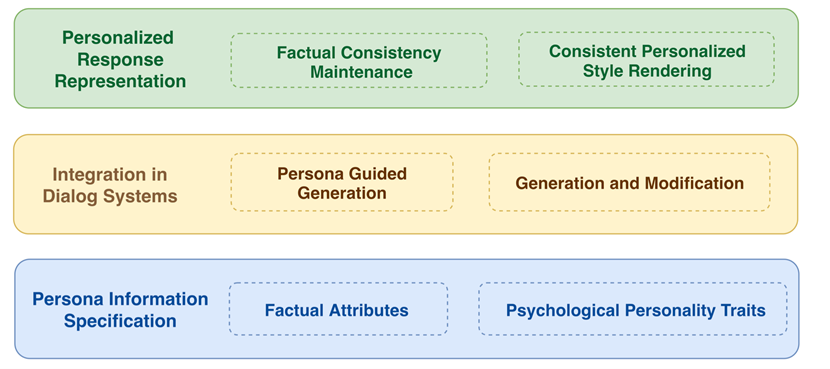Personalization in Dialog System
Overview
One of the fundamental challenges in artificial intelligence (AI) is endowing the machine with the ability to converse with humans using natural language. Personalization in dialog systems is to endow persistent personalities to dialog systems so that they are capable of producing more personal, specific, consistent, and engaging responses than persona-free models. The personality can be factual attributes like age, gender, working places, or psychological personality traits, such as the big-five traits: openness, conscientiousness, extraversion, agreeableness, and neuroticism. This project targets on coherent response generation and exploring the personalization of psychological traits. The persona information could be categorized into factual attributes, and psychological personality traits. The second layer is the general integration approaches in dialog system design. The two mainstream methods are (1) persona guided generation, which incorporate persona representations or key-value pairs into dialog system design. and (2) generation and modification, which first output a gen- eral response trained in large-scale dialog corpus and then modify it with desired personal information. The third layer of the framework is the personalized response representation methodologies. As the ultimate target of personalization is to keep consistency in response generation. The two main aspects to achieve this target are factual consistency maintenance and consistent personalized style rendering.
Project Framework

Achievements
- Wen Z, Cao J, Yang R, et al. Decode with template: Content preserving sentiment transfer[C]//Proceedings of The 12th Language Resources and Evaluation Conference. 2020: 4671-4679
- Zhiyuan Wen, Jiannong Cao, Ruosong Yang, Shuaiqi Liu, and Jiaxing Shen: Automatically Select Emotion for Response via Personality-affected Emotion Transition. Accepted by Findings of ACL-IJCNLP 2021
Members
Zhiyuan Wen


